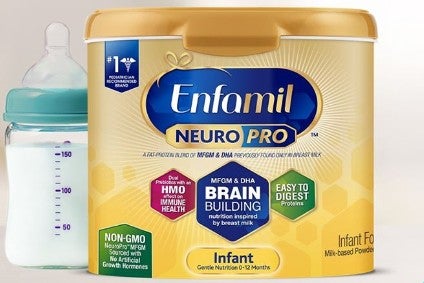
Challenges faced by Mead Johnson in China have led the infant-formula major’s owner, the UK-based consumer-goods group Reckitt Benckiser, to book a writedown of more than GBP5bn (US$6.4bn) today (27 February).
Reckitt, also home to brands such as Durex condoms and Dettol antiseptic, acquired Enfamil maker Mead Johnson in 2017 for US$17.9bn, including debt.

Discover B2B Marketing That Performs
Combine business intelligence and editorial excellence to reach engaged professionals across 36 leading media platforms.
At the time, then Reckitt CEO Rakesh Kapoor described the acquisition as a “significant step forward” in the FMCG group’s “journey as a leader in consumer health”.
However, before the acquisition Mead Johnson had seen declining sales. Reckitt has managed to grow sales for the first two full years after the acquisition but volumes have recently been slowing amid competition in China. In October, Reckitt downgraded its full-year revenue forecast amid “challenging market conditions” in the infant-formula sector.
Today, Reckitt booked an impairment of goodwill of GBP5.04bn on the Mead Johnson acquisition, pointing to the more muted growth prospects for the infant-formula market in China.
“At the time of the Mead Johnson Nutrition acquisition, we expected medium-term market growth of 3-5% and we expected to move the annual growth of the business from an inherited decline to circa 5% over a few years. We also expected to be able to increase the inherited circa 23% operating margin by an incremental 6-7% with GBP200m annual synergies, largely from removing duplicated corporate costs and greater procurement effectiveness. The acquisition model implied a 3% terminal growth rate. The most significant changes, evident over the last year, have been in the China market. The prospects for market growth have lowered, as a sustained materially lower birth rate has become likely,” Reckitt said in a stock-exchange filing. “In addition, the competitive dynamics have changed with evolving regulation and the progress of a number of local competitors.”

US Tariffs are shifting - will you react or anticipate?
Don’t let policy changes catch you off guard. Stay proactive with real-time data and expert analysis.
By GlobalDataReckitt also said the integration of Mead Johnson with other parts of its business had taken longer than expected.
“We have also revised our view on the optimum long-term design of the supply network for the business as a whole. This will be more capital intensive than we had expected. More short-term in nature, the integration of the Mead Johnson Nutrition and Health businesses has progressed more slowly than expected, particularly in Latin America and ASEAN, which has led to weaker performance,” the company said.
“When combined, these factors have led to a reduction in expected revenue growth to circa 3% at constant rates over the next five years; and only a moderate net margin improvement from the current position. The geographies we serve have on average general inflation about 1% higher than sterling. In this context, we now also see a 2.5% terminal growth rate to be more appropriate.”
Like-for-like sales from Reckitt’s infant-formula business declined 1.1% in the fourth quarter of 2019 to GBP727m, compared to a consensus analyst forecast of a 2.1% drop. Reckitt pointed to “strong growth” in the US being offset by a “small decline” in China, where it said its share losses were continuing but improving, as well as “mixed performances” in the Latin America and ASEAN markets.
Over 2019 as a whole, like-for-like sales rose 2.6% to GBP2.98bn thanks to the business in North America.





